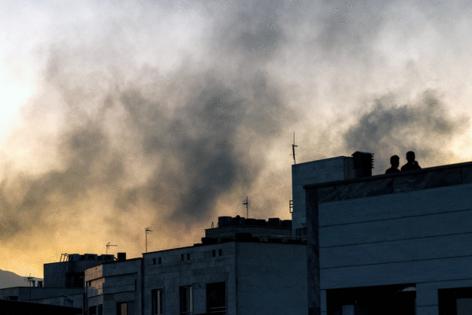In Tehran, Iranians brace for what's next in unpredictable war
Published in News & Features
It started with her neighbor frantically knocking on her front door panicking at the sound of explosions. Then she taped her windows to prevent them from shattering and packed an emergency backpack.
By Tuesday, Neda was on a gridlocked highway, joining thousands of other Tehranis trying to flee the Iranian capital. Their aim was to find somewhere more remote where they wouldn’t be near any of the hundreds of sites that Israel might target.
“My biggest fear is the uncertainty and the ambiguity of it all,” Neda, 35, said by social media chat from a suburb on the outskirts of northern Tehran. “Will this go on for a week or for eight years? Will we have to keep on improvising life one day at a time?”
For the past five days, Israel has subjected Iran to its worst military attack since the Islamic Republic was invaded by neighboring Iraq in 1980. What’s clear in the metropolis of 10 million people, is that people don’t expect things to be the same again in a country whose leadership is hobbled and its economy shattered.
A snapshot of the mood among people contacted in Tehran suggests they expect the regime will be weakened further, but it won’t be toppled. Neda, for one, said she’s no supporter of the Iranian leadership, but right now her ire is directed at Israeli Prime Minister Benjamin Netanyahu.
Whenever the conflict ends, though, major reforms will be inevitable, said Cyrus Razzaghi, president and chief executive of Tehran-based consultancy Ara Enterprise.
That firstly would mean an overhaul of a fragmented intelligence apparatus that’s repeatedly failed to intercept clandestine Israeli operations on Iranian soil that include successive, audacious strikes killing the country’s top military and security officials.
“The Islamic Republic won’t emerge from this conflict unchanged,” Razzaghi said. “Even if regime change is unlikely in the near term, significant internal shifts are expected once the dust settles.”
U.S. President Donald Trump’s increasingly bellicose rhetoric — on Tuesday he told Iranians to evacuate Tehran and demanded surrender — is fanning concerns that the U.S. will join Israel’s assault. Netanyahu has said he is targeting the establishment of the Islamic Republic, not just its nuclear facilities, which he’s threatened to strike for years.
He’s appealed directly to the Iranian public, encouraging them to see his attack as an opportunity for them to oust their oppressive rulers. His military offensive has so far killed 224 Iranians, most of them civilians, according to Iran’s government.
Supreme Leader Ali Khamenei and the Islamist system of rule that he’s fortified around himself have faced unprecedented levels of unpopularity in recent years. They’ve been challenged by some of the biggest protests since the 1979 Islamic Revolution. Their demands have been ignored and the authorities have mostly doubled down on their intolerance for any dissent.
But for now, it’s Netanyahu who is the target of the anger among Iranians.
“I can’t talk for most people but I can talk about most of the people I’m in contact with and I’m certain they share this feeling I have, that with every word he says I feel this boiling rage inside of me,” Neda said of Israel’s prime minister. “My deep hatred for him is increasing.”
Khamenei’s removal could make Iran more confrontational as younger, more ideological officials rise through the ranks of various institutions and try to project the country’s strength, according to Dina Esfandiary, a Middle East analyst at Bloomberg Economics. Targeting Khamenei would also bolster the surge of nationalistic feeling that has begun to emerge since Israel’s strikes, she wrote.
The question is whether that feeling is enough to offset the deep polarization that’s afflicted Iran for years and the anger with which many view the powerful clerical-military cadre that controls the country.
At the moment, there are some sure signs of stubborn resistance. A news anchor of Iranian state television, for example, was heralded by the government for continuing to broadcast during a bombing raid as smoke and dust filled the studio.
But with an economy battered by years of trade embargoes, sanctions and endemic mismanagement, any patience left could quickly run out. Nazanine, a 55-year-old finance officer at a marketing company, is appalled by Netanyahu, though has opposed the Iranian leadership for years. “My hatred for Netanyahu and the Islamic Republic is the same,” she said. “I’m sick of them both.”
An Israeli and Western intelligence assessment seen by Bloomberg suggested that the war could lead to an economic collapse and inflation of 80%, if not higher. That, according to the report, would likely social discontent and challenge the stability of the ruling regime.
Currently Iran’s inflation rate is around 43%, one of the highest in the world, according to the International Monetary Fund. Underscoring a reliance on petrodollars, the country needs an oil price of $163 a barrel — more than double’s today’s level of around $75 — to balance its budget, according to calculations by the Fund.
There are already signs of pain. Since Friday, the rial has weakened more than 10% against the dollar on the black market, according to bonbast.com, a site that tracks the currency’s street value.
For Nazanine, the first task is to confront the shock of having to flee her city. She lives in a wealthy northern Tehran neighborhood that’s been targeted several times by Israel. Her apartment overlooks the now bombed out multistory residence of top Khamenei aide, Ali Shamkhani.
Shamkhani survived the attack and is being treated in hospital, the state-run Nour News reported on Monday without giving details of his injuries.
“I was awake when it all happened,” she said from the relative safety of the countryside on the outskirts of Tehran. “It feels like a real war.”
---------
—With assistance from Rachel Lavin and Alberto Nardelli.
©2025 Bloomberg L.P. Visit bloomberg.com. Distributed by Tribune Content Agency, LLC.







Comments